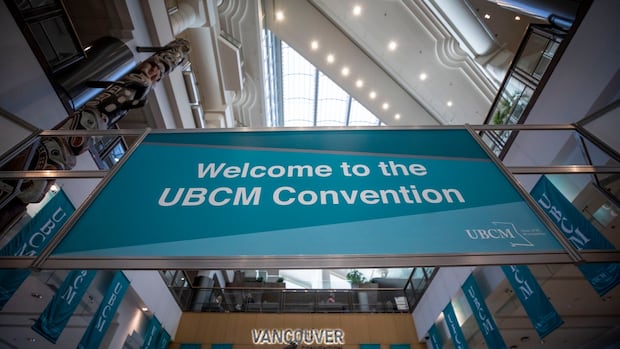British ColumbiaFrom councillor conduct issues to public transit goals, the second day at the Union of B.C. Municipalities convention was a reminder that, as much as the conference is about municipalities, it’s still the provincial government that decides what happens.Day 2 at the convention showed how municipalities’ wants don’t always match what province will provide Justin McElroy · CBC News · Posted: Sep 24, 2025 9:00 AM EDT | Last Updated: 4 hours agoThe UBCM conference is pictured on its first day. (Ben Nelms/CBC)One by one, the middle-aged, white-collar employees wrote their thoughts on small sticky notes given to them by a conflict-dispute specialist, and stuck them to the wall.”Set group norms,” said one. “Respect for differences of opinion,” wrote another. “Literal group therapy,” said a third.Another one said “get drunk and laugh and talk and move on!”It may have sounded like a typical workplace HR session, but it was actually a meeting at the Union of B.C. Municipalities convention, where virtually every mayor and councillor in the province gathers for a week.On Tuesday, among the many forums and policy discussions was one on council conduct – an issue that has increasingly paralyzed municipalities across the province, as elected officials fail to disagree agreeably.The post it note in question. (Justin McElroy/CBC News)90-day suspensions?Earlier this summer, the B.C. government committed to enhanced enforcement of codes of conduct, and greater penalties to try to prevent dysfunctional municipalities.”I am really committed to seeing us continue to make changes on this front, so that residents can have improved accountability,” said Municipalities Minister Christine Boyle, who said the UBCM convention would be an important place to consult about changes that would take effect after next year’s municipal elections. “I think it’s really important that we get input from local governments about what they see on the ground that would make a difference.”During the session, staff members from the ministry outlined some of steps they’re considering, including: A mandatory province-wide code of conduct, instead of each council making it up themselves. A mandatory requirement for third-party investigators or integrity commissioners to resolve disputes and issue punishments, instead of councillors voting on whether to approve investigations or sanction one another. Punishments of up to 90-day suspensions from office. People in the session expressed interest in the initial first steps, but raised concerns about who would pay for investigators, and whether the maximum punishments would be a big enough deterrent. “I’m still worried, and I’m mostly worried because it doesn’t seem to have any teeth,” said Clearwater Mayor Merlin Blackwell, who has written extensively on the issue.”All the [changes] are great, but people are going to behave badly if there’s no actual punishment other than shaking a finger at it.”It remains to be seen whether the UBCM feedback will result in changes, or be the start of a new Sisyphean back and forth between municipalities and the province.No Whistler-Squamish bus anytime soon”We continue to come to the table with the same ask and it’s frustrating, it’s definitely frustrating,” said Whistler Coun. Jen Ford following a different panel on Tuesday.For the eight previous years, delegations from Whistler and Squamish had used the annual transportation forum at UBCM to press for a dedicated bus service connecting their communities, along with those further north in the Squamish Lillooet Regional District, and perhaps even south to Metro Vancouver.Once again, they made their case – and got a lukewarm response in return. “The planning component is really simple. It’s a straight line — where do the bus stops go? The challenge is always the funding and the governance. That’s the tricky part,” said Matthew Boyd, B.C. Transit’s integrated service planning director.Whistler is trying to encourage more people to take the public transit to reduce congestion. (Resort Municipality of Whistler )Boyd suggested the municipalities need to step up their own funding, because projected ridership for the route didn’t meet B.C. Transit’s baseline business model.The response was met with frustration from Ford, who said congestion has only gotten worse on the Sea-to-Sky Highway since the 2010 Olympics.”We have people wanting to get out of their cars and onto buses, and we need to make this happen, but we need the province to come to the table.”It was a reminder that as much as this convention is about municipalities, it’s still the provincial government that decides what happens.Or in the case of a bus between Squamish and Whistler, what doesn’t. ABOUT THE AUTHORJustin is the Municipal Affairs Reporter for CBC Vancouver, covering local political stories throughout British Columbia.
Province calls the shots as municipalities push priorities at UBCM convention











